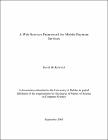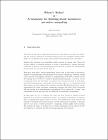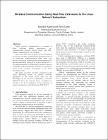Browsing Computer Science Technical Reports by Title
Now showing items 265-280 of 280
-
Unemployment: A Technologist's Perspective
(Trinity College Dublin, Department of Computer Science, 1993-09) -
A Unified Security Framework for Networked Applications
(Trinity College Dublin, Department of Computer Science, 2003-04-23)Various security models have been proposed for different types of applications and numerous types of execution environments. These models are typically reinforced by adding code to the application, which authenticates ... -
Using Case Retrieval to Seed Genetic Algorithms
(Trinity College Dublin, Department of Computer Science, 1997)In this paper we evaluate the usefulness of seeding genetic algorithms (GAs) from a case-base. This is motivated by the expectation that the seeding will speed up the GA by starting the search in promising regions of the ... -
Using CBR techniques to detect plagiarism in computing assignments
(Trinity College Dublin, Department of Computer Science, 1993-09)The problems of case retrieval in CBR and plagiarism detection have in common a need to detect close but not exact matches between exemplars. In this paper we describe a plagiarism detection system that has been inspired ... -
Using Distributed Technology for Teaching Distributed Systems
(Trinity College Dublin. Department of Computer Science, 1999-09)Current developments in multimedia and Internet technologies are enabling their wide use as a means for delivering education and training. There is much diversity and no single architecture has yet emerged as the ... -
Using Diversity in Preparing Ensembles of Classifiers Based on Different Feature Subsets to Minimize Generalization Error
(Trinity College Dublin, Department of Computer Science, 2001-04)It is well known that ensembles of predictors produce better accuracy than a single predictor provided there is diversity in the ensemble. This diversity manifests itself as disagreement or ambiguity among the ... -
Using Dynamic Proxies to Support RMI in a Mobile Environment
(Trinity College Dublin. Department of Computer Science, 2001-09)The emergence of small, mobile computing devices such as personal digital assistants and cellular telephones has been driven by advances in computing and wireless communication technologies. The development of distributed ... -
Using Early Stopping to Reduce Overfitting in Wrapper-Based Feature Weighting
(Trinity College Dublin, Department of Computer Science, 2005-05-18)It is acknowledged that overfitting can occur in feature selection using the wrapper method when there is a limited amount of training data available. It has also been shown that the severity of overfitting is related to ... -
Using Early-Stopping to Avoid Overfitting in Wrapper-Based Feature Selection Employing Stochastic Search
(Trinity College Dublin, Department of Computer Science, 2005-05-11)It is acknowledged that overfitting can occur in feature selection using the wrapper method when there is a limited amount of training data available. It has also been shown that the severity of overfitting is related ... -
Using Events to Implement a Distributed Worm in a Mobile Environment
(Trinity College Dublin. Department of Computer Science, 1999-09)A distributed system comprises a number of independent computers linked together by a network, running a set of software components residing on numerous machines, all working towards a common goal. A worm is a paradigm ... -
Using Fluid Models for AQM Evaluation
(Trinity College Dublin. Department of Computer Science, 2005-09)In spite of the congestion management mechanisms included in the TCP/IP protocol, the Internet still suffers from a lack of optimization in the way network overload is managed. One of the reasons for this is that the ... -
Using Group Communication to Support Inter-Vehicle Co-ordination
(Trinity College Dublin. Department of Computer Science, 2002-09)Recent advancements in wireless communication technology and portable computing are opening up exciting possibilities for the future of mobile network applications. One obvious domain for such mobile network applications ... -
A Web Services Framework for Mobile Payment Services
(Trinity College Dublin. Department of Computer Science, 2003-09)Next generation mobile services are readily emerging into the mainstream services market and this growth is dependent on mobile technologies and their support infrastructure. 2.5G and 3G mobile technologies presently are ... -
Where do "Soccer Moms" Come From? : Cognitive Constraints on Noun-Noun Compounding in English
(Trinity College Dublin, Department of Computer Science, 1996-12)Every year new noun-noun combinations enter the English language and become common parlance; compounds like "notebook computer" and "soccer mom". But, why is one pair of words chosen rather than another pair ? For ... -
Where's Waldo? - or - A taxonomy for thinking about location in pervasive computing
(Trinity College Dublin, Department of Computer Science, 2004-02-06)[Introduction] Virtually all pervasive computing systems use some form of location for affecting the system's behaviour. Location-based services are available commercially, albeit in a primitive form, from many mobile ... -
Wireless Communication Using Real-Time Extensions to the Linux Network Subsystem
(2006)Timely wireless communication is essential to allow real-time mobile applications, e.g., communication between mobile robots and intervehicle communication to be realized. The current IEEE 802.11 ad hoc protocol is ...



















